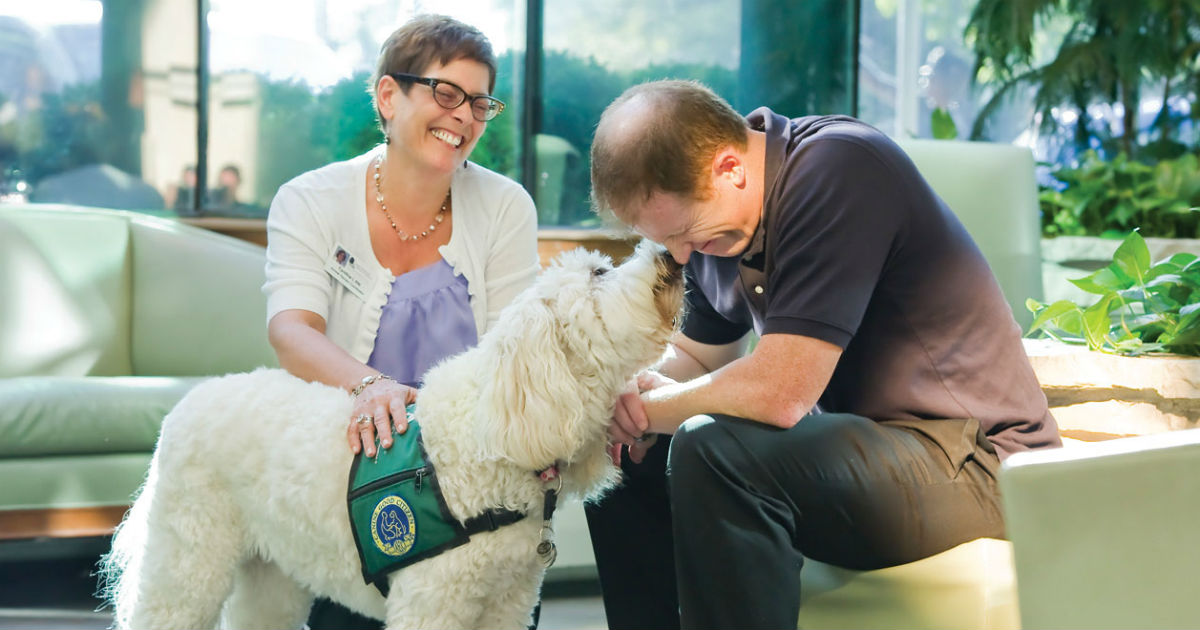
A wag of the tail. A gentle lick to the face. The unconditional love in a furry snuggle. Dogs are called man’s best friend for good reason—just being around the amiable creatures may instantly make a bad day brighter. A growing body of research suggests that’s especially true for those with diseases like cancer.
Studies have shown that animal-assisted therapy may help decrease anxiety and pain, lower blood pressure and help alleviate depression, while offering welcome companionship and a positive distraction from treatment schedules and worries.
Cynthia Ingram, Animal Therapy Coordinator at Cancer Treatment Centers of America® (CTCA), Chicago, witnesses the positive effects firsthand while making patient rounds with Tori, her irresistibly friendly therapy dog partner. “When she walks in, you just see people relax and become more at ease,” says Ingram, a Registered Nurse and board-certified Holistic Nurse.
Due to the COVID-19 pandemic, CTCA® Chicago made the difficult decision to have Tori stay out of the hospital. “Now, Tori is back in the hospital doing what she does best, providing love and support to our patients and their caregivers,” Ingram says.”
Easing anxiety and stress
In a 2015 study in the Journal of Community and Supportive Oncology, researchers followed patients who were visited by therapy dogs while receiving chemotherapy and radiation treatments for gastrointestinal or head and neck cancers. "Having an animal-assisted visit significantly improved their quality of life and 'humanized' a high-tech treatment," says Stewart B. Fleishman, MD, principal investigator in the study.
Another 2015 study in Canada looked at how animal-assisted therapy helped women with breast cancer. Researchers determined that pet therapy helped calm patients and ease their anxiety and stress, adding in the study’s conclusion that it also “promoted increased communication with health professionals.”
Therapy pets may be especially beneficial to cancer patients by:
- Easing their anxiety and elevating their mood
- Offering company and comfort, thereby lessening feelings of isolation or loneliness
- Providing a distraction from pain, stress or boredom
- Relaxing them, especially since petting or snuggling with a soft, friendly animal may release endorphins that have a calming effect
- Motivating them to get better
- Increasing socialization and encouraging communication
Not for everyone
Animal-assisted therapy may not be a good fit for all patients, however. Some patients may be allergic to animals. Others may be afraid or uncomfortable around them. Patients, especially those who have a suppressed immune system, should talk to their doctor before considering pet therapy.
Pets of all kinds, including cats, have been used as therapy animals to elevate the mood and lower patients’ stress level. Dogs, though, remain the most common therapy pet, especially in a hospital setting.
“As a true dog lover, especially of golden retrievers, I can tell you these wonderful animals may provide great support for patients, in general, and cancer patients, in particular,” says Maurie Markman, MD, President of Medicine & Science at CTCA.
Learn about spiritual support for cancer patients and their families.


